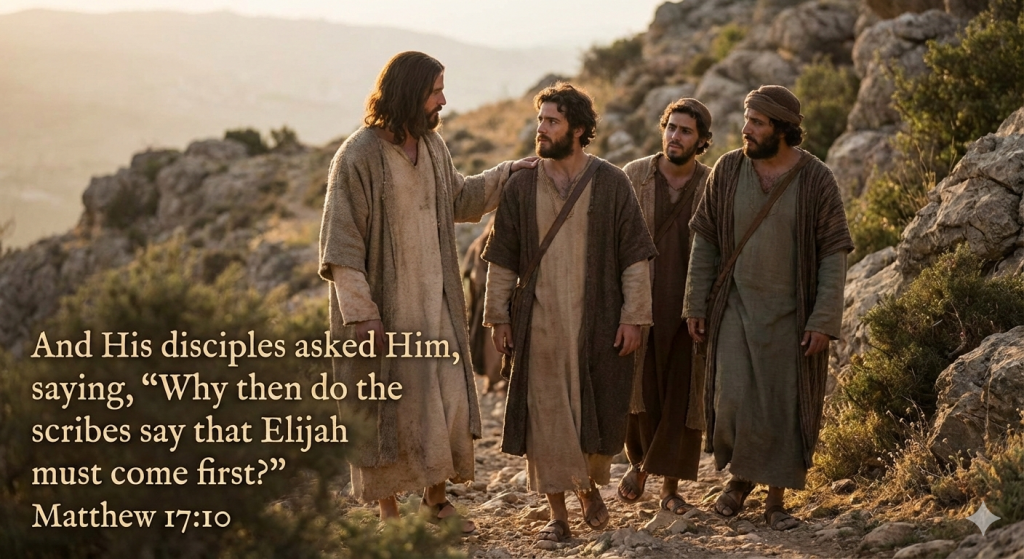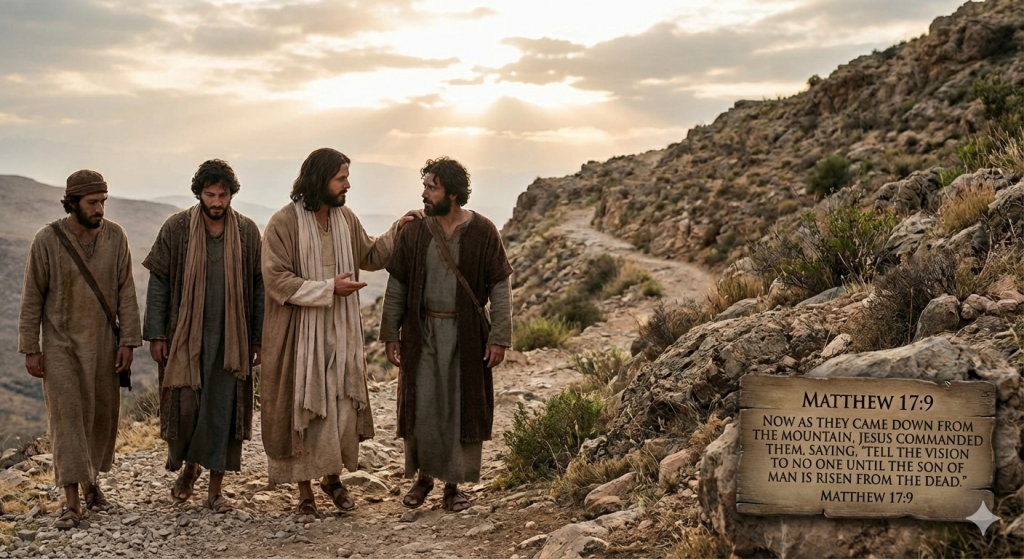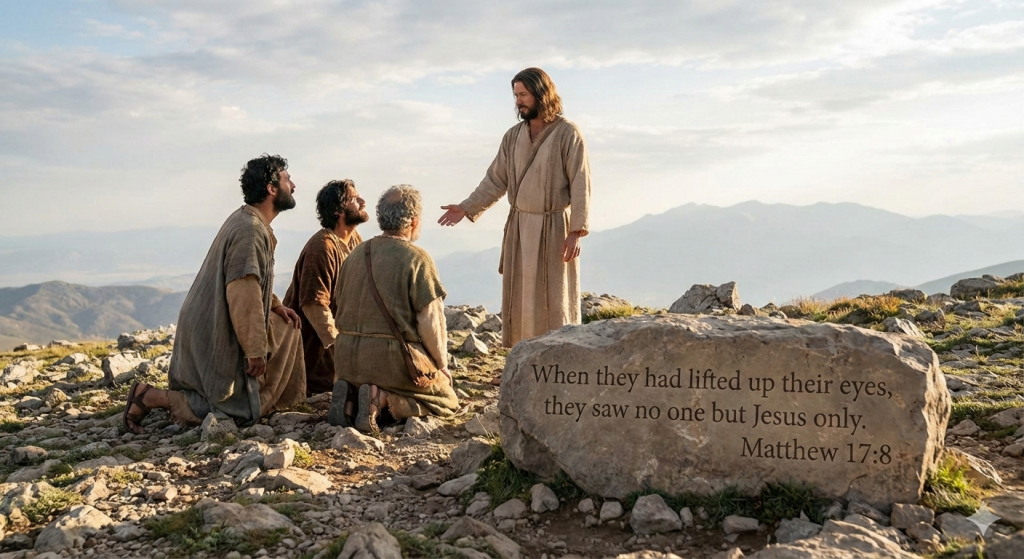Wednesday, 25 February 2026
Jesus answered and said to them, “Indeed, Elijah is coming first and will restore all things. Matthew 17:11
Note: You can listen to today’s commentary courtesy of our friends at the “Bible in Ten” podcast. (Click Here to listen)
You can also read this commentary, scrolling with music, courtesy of our friends at “Discern the Bible” on YouTube. (Click Here to listen), or at Rumble (Click Here to listen).
“And Jesus answering, He said to them, ‘Elijah indeed, he comes first, and he will reconstitute all’” (CG).
In the previous verse, the disciples queried Jesus, asking, “Why therefore the scribes, they say that Elijah, it necessitates, to come first?” Having recalled that, Matthew next records, “And Jesus answering.”
What Jesus says is the spoken word of God. Therefore, what He says is to be taken literally. He will make His statement based on what Scripture has already taught about Elijah. Therefore, what seems contradictory in the coming verse is due to a misunderstanding of what Jesus is saying. Understanding this, “He said to them, ‘Elijah indeed, he comes first.’”
Some texts omit the word “first,” as if this resolves the issue that many find difficult to understand. However, Mark 9:12 includes the word “first,” but accompanies it with an aorist participle, saying, “Elijah, indeed, having come first, he reconstitutes all.”
Thus, there is no reason to assume the word “first” doesn’t belong here. The words of Jesus so far don’t tell when Elijah is coming. It is a statement of fact, “He comes first.” However, the next words add more clarification, saying, “and he will reconstitute all.”
The future tense leaves no doubt that Elijah’s coming is yet ahead. Therefore, what is coming is what was prophesied in Malachi 4 concerning him –
“Behold! I sending to you Elijah the prophet,
To faces coming day Yehovah –
The whopping and the ‘being feared,’
6 And he will cause to return, heart fathers, upon sons,
And heart sons, upon their fathers.
Lest I come, and I cause to strike the land – anathema.” Malachi 4:5, 6 (CG)
These are not words describing immediate family relations, as in, “He will turn the people in the families to love one another.” Rather, this is a word concerning the Hebrew people as a whole. The fathers are the patriarchs, especially Abraham, Isaac, and Jacob.
The children are those who have misunderstood both the promise to the patriarchs and the purpose of the law. The heart of the fathers was that of promise while trusting in the gospel of the grace of God. Paul explains this in Galatians 3 –
“And the Scripture, foreseeing that God would justify the Gentiles by faith, preached the gospel to Abraham beforehand, saying, ‘In you all the nations shall be blessed.’ 9 So then those who are of faith are blessed with believing Abraham.”
…
“And this I say, that the law, which was four hundred and thirty years later, cannot annul the covenant that was confirmed before by God in Christ, that it should make the promise of no effect. 18 For if the inheritance is of the law, it is no longer of promise; but God gave it to Abraham by promise.” Galatians 3:8, 9, & 17, 18
The hearts of the children, the unbelievers of Israel, will have their hearts turned to the hearts of the fathers who trusted the gospel of Christ as a certain and sure promise. If they do not turn their hearts, the warning stands.
Life application: The Old Testament, the time of man’s living under the curse of law, ends with the word kherem, anathema. It speaks of the utter destruction or ban of something. It is a fitting end to the thirty-nine books of law.
Only with the hope of God in Christ is there life and renewed fellowship with God. Only in understanding the gospel can that state be realized.
As with the whole chapter of Malachi 4, the final words speak of a dual fulfillment. The first part of it came about when Israel rejected Jesus. He told them as much in Matthew 23:36, saying, “Assuredly, I say to you, all these things will come upon this generation.”
The nation as a whole rejected Jesus, remained under law, and fell under the ban because of it. The second fulfillment will be for those of Israel who continue to reject Jesus during the tribulation. However, for the nation, that will eventually end. The land of Israel, symbolized by Jerusalem, was anathema because of Israel’s rejection of Jesus. This is seen in Zechariah 14:11 –
“The people shall dwell in it;
And no longer shall there be utter destruction [kherem],
But Jerusalem shall be safely inhabited.”
This prophecy concerns the future when Israel finally receives Jesus. Only when the hearts of the children are turned to the hearts of the fathers, meaning those who lived in faith and not by law, will this time of woe for Israel end.
The day is coming, and the world is being readied for it with the return of Israel to her land. The nation has been reestablished, prophecies of the past have come to their fulfillment, and many more prophecies are set to be fulfilled.
The book is written, and these things will come about. We are simply spectators watching as the words of Scripture are faithfully realized, often before our own eyes. At some point, the rapture will take place, and the attention of the Lord will be directed to bringing about the final restoration of Israel while also bringing about judgment upon all who refuse to believe.
Malachi sets forth both the hope of restoration and the warning of rejecting it. Though it is directed to Israel, for those who know Jesus, both Jews and Gentiles, we can learn from what is said there.
Our trust is not to be in the Law of Moses but in the One who is spoken of there and throughout all of Scripture. It is not easy to let go and place ourselves solely under the authority of another, but we must do so. If we are in need of surgery, we have to trust that the surgeon will get us through the ordeal.
In the case of our eternal souls, we have to let go of trusting in ourselves and look to the eternal gospel, which God has slowly and methodically revealed to the world through His word. And that gospel is centered completely and entirely on the Person of Jesus Christ.
Lord God, help us in our stubborn desire to earn what You have so freely given. May we never assume that we can somehow merit Your gracious offering of Jesus. Rather, may we trust only in the word that tells us of what He has done, accepting it as the one acceptable means of restoration with You. Thank You for Your grace, which is found in Jesus Christ! Amen.





